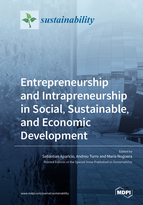Entrepreneurship and Intrapreneurship in Social, Sustainable, and Economic Development
A special issue of Sustainability (ISSN 2071-1050). This special issue belongs to the section "Sustainable Management".
Deadline for manuscript submissions: closed (31 July 2020) | Viewed by 86834
Special Issue Editors
Interests: entrepreneurship; economic growth; institutional economics; sustainable development
Interests: Intrapreneurship, Institutional economics, Innovation, Firm growth
Special Issue Information
Dear Colleagues,
Entrepreneurship is a research area that has grown rapidly over the last 30 years. Scholars from different disciplines have contributed to understanding psychological, sociological, anthropological, managerial and economic aspects of entrepreneurial activity (Landström, Harirchi, and Åström, 2012). Among these contributions, academia has recognised the importance of institutions not only for entrepreneurship but also for economic development (Bjørnskov and Foss, 2016). Yet, there is still much room to keep exploring how other sorts of entrepreneurial activities can enhance economic, social and sustainable development from an institutional perspective (Urbano, Aparicio, and Audretsch, 2019).
Although entrepreneurship is diverse in terms of its types and nature, particular gaps might exist from sociodemographic characteristics, corporate dynamics, regional and national outputs and environmental issues (Audretsch, Kuratko, and Link, 2015). For example, finer connections between women’s entrepreneurship (Noguera, Alvarez, and Urbano, 2013), intrapreneurship (Turró, Urbano, and Peris-Ortiz, 2014) and sustainable entrepreneurship (Pacheco, Dean, and Payne, 2010), among other (less explored) types of entrepreneurial activities and development, might serve to improve our understanding of entrepreneurial behavior.
There is also a lacuna about the role of the institutional context (North, 1990) in shaping individual decisions not only for becoming entrepreneurs (Yunis, Hashim, and Anderson, 2019) but also for undertaking innovative projects within firms (Turró et al., 2014). Hence, it is suggested that institutions may condition the identification of entrepreneurial opportunities that offer solutions for social and sustainable problems at the regional and country level (Pacheco et al., 2010).
Given these research opportunities, the aims and scope of this particular Special Issue are very broad. Specific topics, therefore, may include but are not limited to explorations about the influence of (formal and informal) institutions on gender issues, corporate entrepreneurship and intrapreneurship, as well as on green entrepreneurial activity for sustainable development. To achieve this aim, this Special Issue invites scholars within all the main economics, management and sustainability subdisciplines, among others areas, to submit conceptual and/or empirical papers which present cutting-edge research on entrepreneurship and intrapreneurship for sustainable development at the regional and national level. Papers which examine trends and initiatives, employ original methodologies and offer interesting empirical insights and theoretical contributions to this issue are very welcome.
Many thanks in advance for considering this Special Issue and we look forward to hearing from you.
References
Audretsch, D. B., Kuratko, D. F., & Link, A. N. (2015). Making sense of the elusive paradigm of entrepreneurship. Small Business Economics, 45(4), 703-712.
Bjørnskov, C., & Foss, N. J. (2016). Institutions, entrepreneurship, and economic growth: what do we know and what do we still need to know? Academy of Management Perspectives, 30(3), 292-315.
Landström, H., Harirchi, G., & Åström, F. (2012). Entrepreneurship: Exploring the knowledge base. Research Policy, 41(7), 1154-1181.
Noguera, M., Alvarez, C., & Urbano, D. (2013). Socio-cultural factors and female entrepreneurship. International Entrepreneurship and Management Journal, 9(2), 183-197.
North, D. C. (1990). Institutions, institutional change and economic performance. Cambridge: Cambridge University Press.
Pacheco, D. F., Dean, T. J., & Payne, D. S. (2010). Escaping the green prison: Entrepreneurship and the creation of opportunities for sustainable development. Journal of Business Venturing, 25(5), 464-480.
Turró, A., Urbano, D., & Peris-Ortiz, M. (2014). Culture and innovation: The moderating effect of cultural values on corporate entrepreneurship. Technological Forecasting and Social Change, 88, 360-369.
Urbano, D., Aparicio, S., & Audretsch, D. (2019). Twenty-five years of research on institutions, entrepreneurship, and economic growth: what has been learned? Small Business Economics, 53(1), 21-49.
Yunis, M., Hashim, H., & Anderson, A. (2019). Enablers and Constraints of Female Entrepreneurship in Khyber Pukhtunkhawa, Pakistan: Institutional and Feminist Perspectives. Sustainability, 11(1), 27.
Dr. Sebastian Aparicio
Dr. Andreu Turro
Dr. Maria Noguera
Guest Editors
Manuscript Submission Information
Manuscripts should be submitted online at www.mdpi.com by registering and logging in to this website. Once you are registered, click here to go to the submission form. Manuscripts can be submitted until the deadline. All submissions that pass pre-check are peer-reviewed. Accepted papers will be published continuously in the journal (as soon as accepted) and will be listed together on the special issue website. Research articles, review articles as well as short communications are invited. For planned papers, a title and short abstract (about 100 words) can be sent to the Editorial Office for announcement on this website.
Submitted manuscripts should not have been published previously, nor be under consideration for publication elsewhere (except conference proceedings papers). All manuscripts are thoroughly refereed through a single-blind peer-review process. A guide for authors and other relevant information for submission of manuscripts is available on the Instructions for Authors page. Sustainability is an international peer-reviewed open access semimonthly journal published by MDPI.
Please visit the Instructions for Authors page before submitting a manuscript. The Article Processing Charge (APC) for publication in this open access journal is 2400 CHF (Swiss Francs). Submitted papers should be well formatted and use good English. Authors may use MDPI's English editing service prior to publication or during author revisions.
Keywords
- entrepreneurial activity
- intrapreneurship
- gender
- institutions
- sustainable entrepreneurship
- national growth
- regional development







